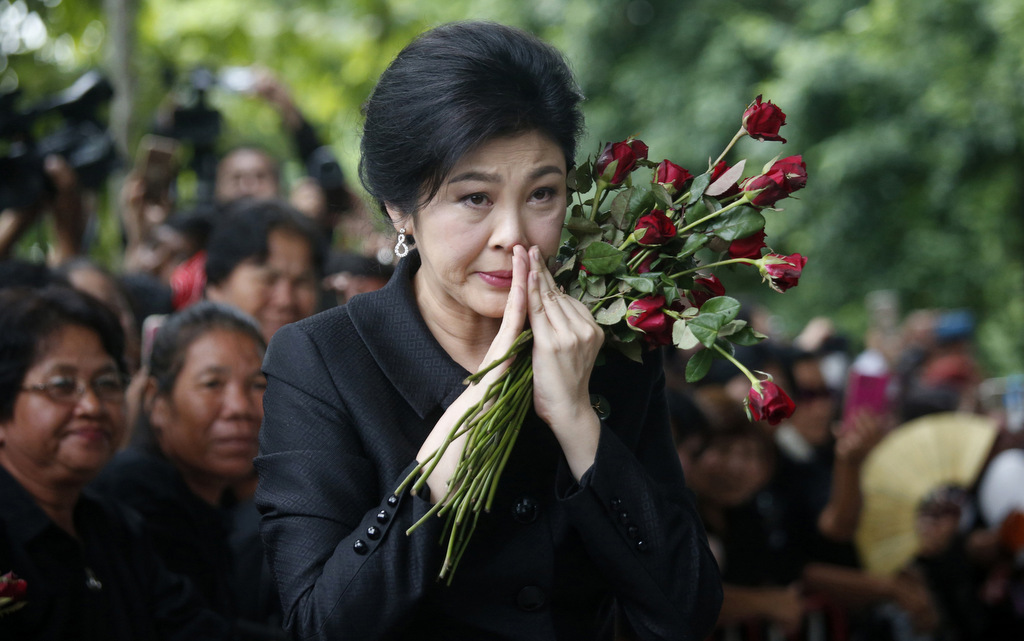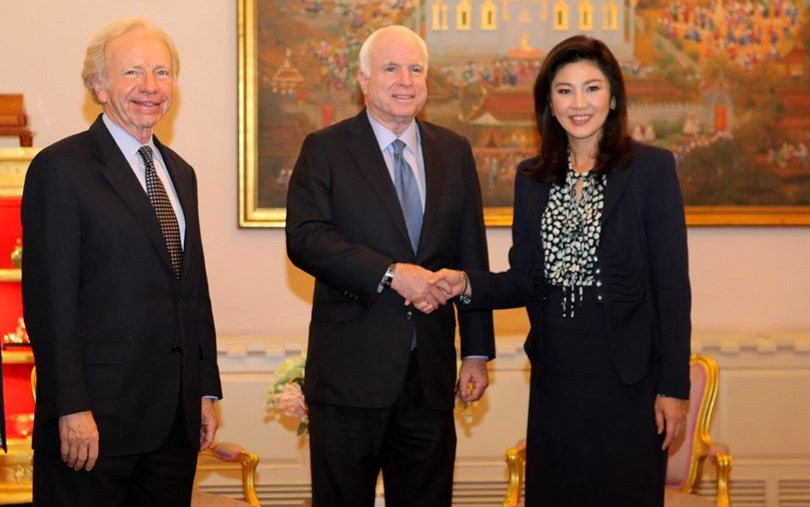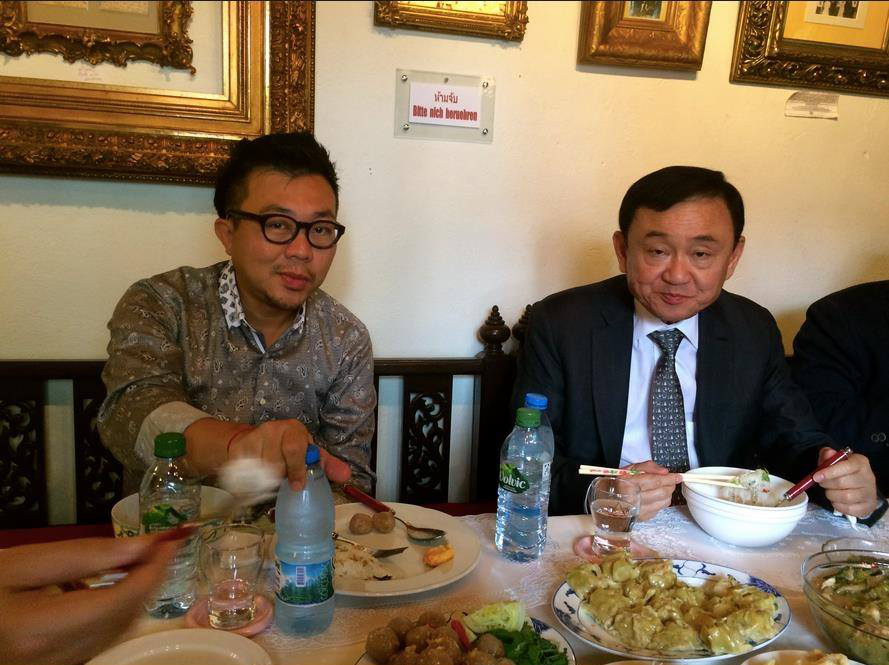
Former Thailand’s Prime Minister Yingluck Shinawatra arrives at the Supreme Court for the last day of her hearing in a corruption trial in Bangkok Thailand. (AP/Sakchai Lalit)
A crisis is brewing in Thailand as the outcome of a contentious court case threatens to plunge the country into chaos. This case, the final verdict of which is expected to be delivered on Aug. 25, centers around a corruption scandal involving former Prime Minister Yingluck Shinawatra — a member of the Shinawatra political dynasty, which has long been backed by U.S. interests.
Shinawatra stands accused of orchestrating an illegal vote-buying scheme in which farmers were promised above-market rates for rice in return for their votes in the 2011 election. The rice-buying program that followed Shinawatra’s electoral victory soon turned into an epic blunder, costing the government billions of dollars and bringing the nation’s agricultural industry to its knees.
The scandal caused complete chaos for the Shinawatra administration, leading Ms. Shinawatra to even dissolve Parliament and attempt to call early elections to stem the tide of public anger against her. However, given that the Shinawatra family has won every election since 2001, her critics slammed the call for early elections, claiming that the results would be fixed in her favor. Shinawatra was eventually removed from power in 2014 after months of street protests and a military coup. In the wake of her removal, the Thai military appointed a new legislature and has been in control ever since.
If found guilty, Shinawatra could face up to 10 years in prison, along with the forfeiture of her assets, in order to compensate for financial losses caused by her government’s ill-fated rice-buying program. A guilty verdict would also place increased scrutiny on the currently ruling military junta, which will likely be accused by Shinawatra supporters of trying to “silence” its political enemies.
Yet, if she is found innocent, the junta will lose public legitimacy, as it has long justified its usurpation of state power by highlighting the corruption of the Shinawatra administration.
Ex-PM Thaksin Shinawatra still pulling the strings
In the weeks leading up to the decision, U.S. political interests and the corporate media have been preparing for yet another foreign-backed destabilization effort with the intention of putting the Shinawatra family back in power.

The “two horsemen of US regime change,” US Senator’s John McCain and Joseph Lieberman, appear and surround the US proxies of choice ahead of any US-backed attempt to destabilize and overthrow a sovereign nation. Here they lend support to Yingluck Shinawatra ahead of her anticipated ousting from power in 2014.
The ties between the U.S. and the Shinawatra family go back decades, largely beginning when telecommunications billionaire and Yingluck’s brother Thaksin Shinawatra served as an adviser to the Carlyle Group, a controversial hedge fund for war-making and espionage with deep connections to the CIA and U.S. State Department.
Thaksin Shinawatra left his position at the Carlyle Group after being elected as Thailand’s prime minister in 2001. He would serve in that position until 2006 when he was removed from power after months of street protests and a subsequent military coup — the same fate that would later befall his sister.
Yingluck rice ruling to open old wounds |
Shinawatra family are the Wound Thaksin inflicted on Thailand. https://t.co/K99wXFS4KF— Tony Baloney (@KirklandTony) July 25, 2017
Thaksin Shinawatra, while prime minister, became notorious for both corruption and for his “war on drugs” which killed an estimated 2,800 civilians in its first three months. A 2007 investigation later found that more than half of those killed had no connections to drugs whatsoever. Moreover, Thaksin Shinawatra’s reign was also notable for a string of abductions, intimidation, and assassinations of his political opponents. He fled the country after being found guilty on corruption charges and continues to live in exile.
Though exiled, his power in Thailand did not wane. When Yingluck Shinawatra launched her campaign for the 2011 election, she essentially ran as a proxy for her brother. Indeed, the campaign slogan of the Shinawatra’s Pheu Thai Party (PTP) for 2011 was literally, “Thaksin Thinks, PTP Does.”
Journalist Tony Cartalucci noted that this was essentially an open admission that “a convicted criminal and fugitive was running PTP from a hotel room in Dubai, United Arab Emirates, not those in Thailand on the actual ballots people were casting.”
After Thaksin was removed from power in 2006, he and his U.S. backers created street mobs known as the “United Front for Democracy Against Dictatorship” (UDD or the “red shirts”). Since 2006, this group has carried out attacks, committed murder and orchestrated wide-scale armed riots and insurrections. Some independent analysts have openly called them terrorists.
#Thailand: supporter of US-backed ousted dictator Thaksin Shinawatra behind terrorist bombings. Posed w/gun stolen during 2010 red riots. pic.twitter.com/yGeFBMoi9v
— AltThaiNews (@AltThaiNews) June 17, 2017
The UDD’s handiwork also includes the violence that engulfed Thailand in 2010, which claimed nearly 100 lives and culminated in mass arson in Bangkok and vicious attacks targeting anti-Shinawatra protesters between 2013 and 2014 that left over 20 dead, including women and children. This year, they were responsible for a bombing spree that targeted civilian infrastructure, including a hospital.
Thailand’s role in U.S. containment of China
With the court decision quickly approaching, it is no surprise that the U.S. Embassy, along with many of the “impartial” NGOs that the U.S. government directly funds – including Prachatai, Thai Lawyers for Human Rights (TLHR), Thai Netizen and the New Democracy Movement – are again working to skew public perceptions of the situation in Thailand in favor of the interests of the Shinawatra family and their foreign backers.
The corporate media has also been busy preparing the narrative for the coming destabilization of Thailand. Western media have run several stories covering Shinawatra supporters who have shown their support for the embattled former prime minister as the trial winds down. The Japan Times recently published a related op-ed by Pavin Chachavalpongpun, who the media has treated as an “impartial” academic, despite his close ties to the Shinawatra family.

Pavin Chachavalponpun poses as an impartial academic, but is in fact a long-time member of Thailand’s US-backed opposition and a close associate of the Shinawatras. Here, Pavin Chachavalponpun shares a meal with convicted criminal, fugitive, and mass murderer, Thaksin Shinawatra.
In his op-ed, titled “Trial of Yingluck Sparks Deeper Crisis for Thailand,” Chachavalpongpun paints the trial as an attempt by the junta to strength its power by attacking Ms. Yingluck, who he describes as unjustly targeted and a champion for the working poor. He does, however, note that she was essentially a proxy leader (i.e. puppet) for her brother.
Notably, Chachavalpongpun plainly states that if Yingluck is jailed or her assets confiscated, there will be protests in the streets and even violence similar to that which occurred in 2006 and again in 2010. This same tactic is similar to those used in the past by U.S. and European interests in Syria, Ukraine and Venezuela, among others.
What reason does the U.S. have to be involved in Thailand? While Thailand does boast natural gas and mineral reserves, the U.S. strategy in Thailand is not so much about resources but part of a larger regional strategy — one that seeks to create a united front of U.S. influence surrounding China in order to reassert U.S. dominance in the region. This goal was notably expressed by former Secretary of State Hillary Clinton who, in a private speech in 2013, stated “we’re going to ring China with missile defense. We’re going to put more of our fleet in the area.”
Watch journalist John Pilger discuss U.S. strategy in Asia to target China:
This mindset has been reflected in the U.S.’ dealings with many Asian countries in recent years. This year alone, the U.S. has strong-armed Japan, Taiwan and South Korea into buying and deploying considerable amounts of U.S.-made weapons and military assets, as well as pushed for an end to the pacifism that has defined these nations’ foreign policies for decades. Those nations that have chosen not to play along, mainly the Philippines, have found themselves the victims of foreign-led destabilization efforts. Depending on the verdict of this high profile court case, Thailand will find itself sitting in one of these two camps.
Source Article from http://www.mintpressnews.com/u-s-prepping-verdict-former-thai-pm-corruption-trial/230625/
Related posts:
Views: 0
 RSS Feed
RSS Feed

















 August 8th, 2017
August 8th, 2017  Awake Goy
Awake Goy 




 Posted in
Posted in  Tags:
Tags: 
















